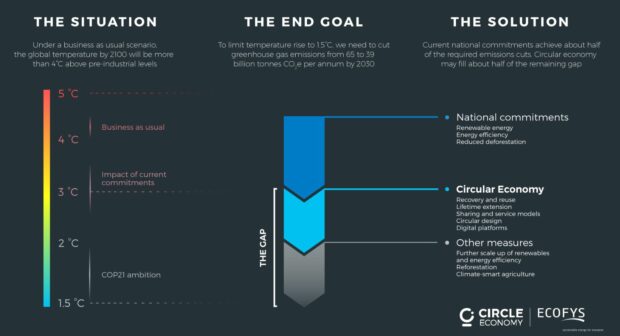Today at the London Business & Climate Summit, Circle Economy and international consultancy Ecofys have called for a rapid transition to a global circular economy to meet the ambitious Paris climate agreement. According to an estimate by the two organisations, circular economy strategies may deliver emissions reductions that could cut the 1.5 °C emissions gap in half.
The emissions reduction commitments made by 195 countries at the COP 21 Paris Agreement, are not sufficient to limit global warming to 1.5 °C. To reach the 1.5 °C ambition it is estimated that additional emissions reductions of 15 billion tonnes CO2e per year need to be achieved by 2030. Circle Economy and Ecofys estimate that circular economy strategies may deliver emissions reductions that could basically bridge the gap by half.
Circle Economy and Ecofys have issued a white paper that informs on key strategies to move to a circular state. It also highlights existing circular examples in the world today. The white paper will form part of a further comprehensive analysis of the new climate agreement and targets and circular economy’s contribution to the same. The white paper and initiative were launched today at The Business & Climate Summit in London where institutional Business and climate leaders are working together to deliver real climate action.
Launching the whitepaper on behalf of Circle Economy, Andy Ridley, CEO said: “The research clearly shows that there is a massive role for the circular economy. Not only as the ‘missing part of the puzzle’ to make our Paris targets achievable, but also as a practical and scalable approach to decouple unsustainable material use from prosperity. This makes the circular economy a vital addition to the mix of solutions to address climate change. We urge companies and governments to embed the circular economy in their climate strategies and policies, and prompt the next wave of climate action through circularity.”
“The momentum from a circular economy can provide a basis for the transition to a low carbon economy with secure sustainable economic growth and prosperity for all. To reduce the risk, companies need to find new ways of doing business. The sooner this is accomplished, the less disruptive and more cost-effective the transition will be,” adds Preeti Srivastav, Project Director of Corporate Climate Action at Ecofys.
Circle Economy and Ecofys will support both companies and governments to amplify the circular economy contribution to climate change and in translating the Paris Agreement from a diplomatic settlement between countries into a catalytic instrument for the real economy.
The white paper is available for download.



